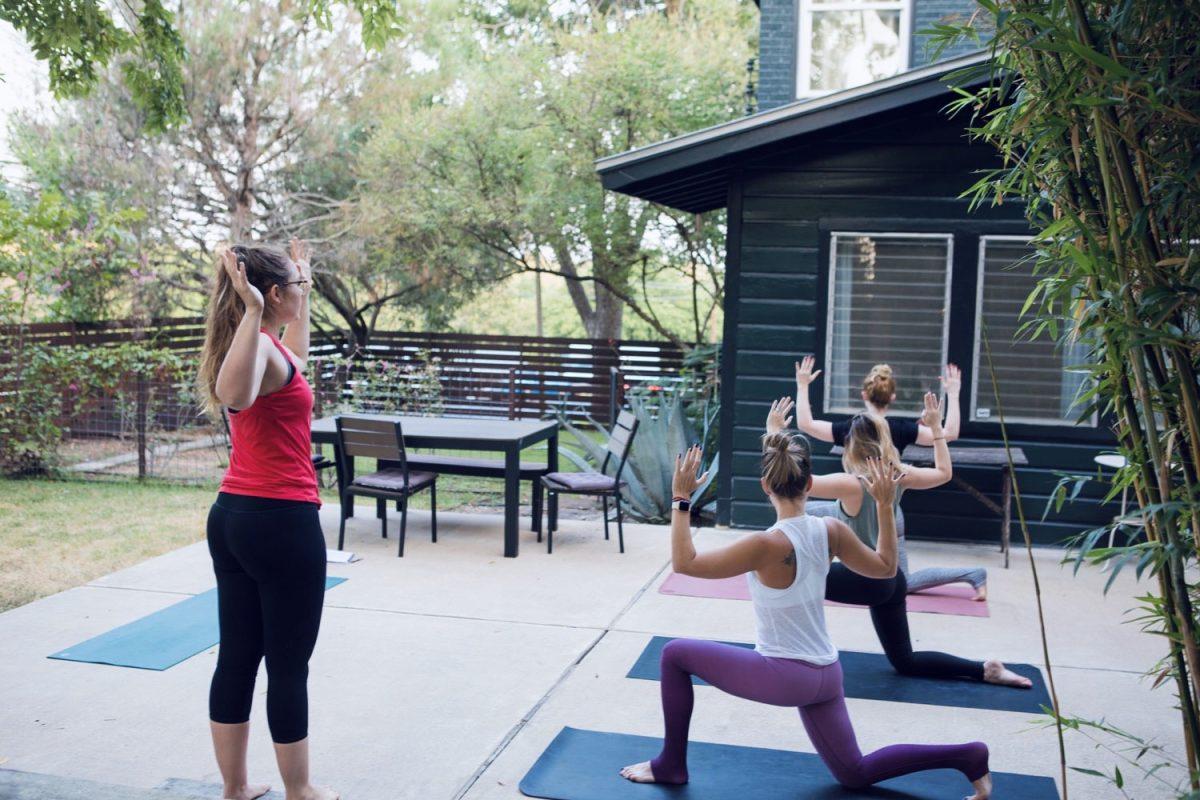Plans have been canceled and daily routines have crumbled in the wrath of COVID-19. The chaos infused with the coronavirus brings a cloud of uncertainty over the nation, often instilling increased feelings of fear, stress, anxiety and depression as to when life will return to normal. With online classes and shelter-at-home orders for the foreseeable future, it is more important than ever to take care of oneself.
1. Stay physically active (within home limits)
Luckily being alive in the age of the internet means an abundance of workout videos from Youtube that can easily be transferred to the comfort of a living room. Yoga is an ancient practice, which focuses on both the mind and body to create control of breath through slow movement.
Ashley Spradlin, a yoga instructor at Red Dawg Hot Yoga located on 1917 Dutton Drive in San Marcos, said yoga became a staple in her life when she was struggling with anxiety after a major life change of moving to a new country.
A common misconception for beginners is the fixated thought that a pose has to be perfect, resulting in an out-of-breath and overwhelmed individual. Spradlin said one of the most important aspects of yoga is the focus of breath. An individual can achieve this by spending five to ten minutes a day alone with no distractions, the slow breaths will become a habit making it easier to work in the poses.
“I think for many of us, we are afraid to feel how we feel or have some sort of judgment to any feelings that we perceive as negative,” Spradlin said. “With yoga, practice, mindful breathing and mindful movement, we are able to allow whatever we are feeling to flow through us. Without saying that is good or bad, we can notice where (the feeling) comes from, then the changes that are needed to move into a healthier space become a little easier.”
2. Attempt to find the positive within the negative
Right now it may feel social media is a channel for negativity with only news of the spread of the virus. It can feel overwhelming to receive mass quantities of information on a heavy topic seemingly offering no other source of hope.
Dr. Millie Cordaro, psychology professor at Texas State with a background in counseling psychology, said looking at the current situation through a lens of silver linings is a good tool to use when an individual feels as if they are slipping into a state of anxiety.
“Silver linings are when we are reframing some of our negative thought patterns,” Dr. Cordaro said. “Retraining ourselves at the moment to realize that despite all the bad things going on there are some good things too.”
Cordaro said the hectic aspect of the coronavirus will soon simmer down, pushing the play button on a normal life, meanwhile, this time can be used to start projects or hobbies that would have been buried under everyday routines. She said more activities to decrease stress levels are staying connected with family and friends through video apps and bullet journaling.
“Think about being alone—it is quality time with ourselves, it is getting to know who we are and what makes us happy,” Cordaro said. “Write a menu going back to self-care and write everything that brings you an ounce of joy. When you are starting to feel down, pick something to do from your menu.”
3. Get in the habit of reestablishing a daily routine
An excessive amount of time is now made available for most people, with limited places to go or places to be, it can be easy to slip out of a daily routine.
Richard Martinez, psychologist with the Texas State Counseling Center, said it is important to reestablish daily routines for a sense of control during an uncontrollable situation. He said writing a list of activities to do with set times will provide a basic outline for each person to accomplish each day
Martinez said setting alarms throughout each day will help a person gain access to a regular schedule again. He said setting alarms may be effective if the individual is wanting to limit social media exposure.
“It can be overwhelming if you’re sitting there all day waiting for an update,” Martinez said. “(It is vital to recognize) those boundaries and being really intentional to what we are exposing ourselves to.”
For information on ways to stabilize mental health during this time, reach out to a mental health professional or Texas State’s Counseling website for additional resources https://www.counseling.txstate.edu.
Categories:
Three self-care tips to ensure healthy habits while in quarantine
March 28, 2020
Ashley Spradlin, a yoga instructor teaches a small group of students at a retreat in Austin, Texas. Photo credit: Photo courtesy of Ashley Spradlin
0
Donate to The University Star
Your donation will support the student journalists of Texas State University. Your contribution will allow us to purchase equipment and cover our annual website hosting costs.
More to Discover








